The birthday of the great Alan Reed was last week and the Flintstones’ will arrive on Blu-ray in October, so let’s take a Spin through some lesser-known Disney-Reed recordings.
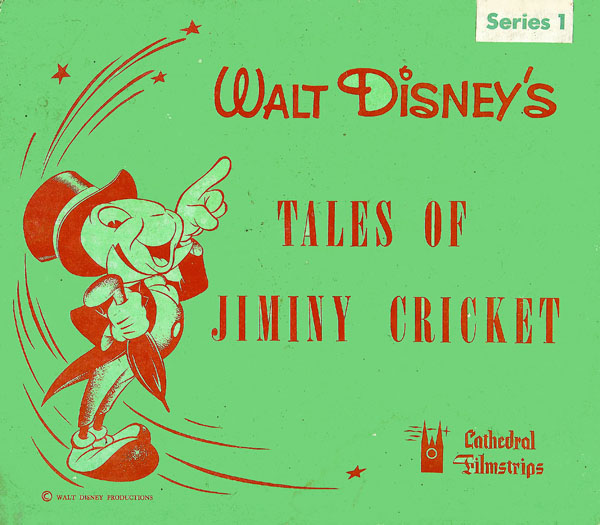
Walt Disney’s TALES OF JIMINY CRICKET
Narrated by Cliff Edwards
Introduced by Paul Frees
Encyclopedia Britannica Films / Cathedral Films (12” 33 rpm LPs with Filmstrip / Mono)
Released 1959-1960. Producer: James K. Friedrich, D.D., I.H.D. Director: James L. Tyler.
Walt Disney’s 1955 classic Lady and the Tramp marked the first time that actor Alan Reed was heard in an animated feature, as Boris the Russian Wolfhound in the memorable dog pound sequence (his cartoon voice debut was the Goofy short Teachers are People (1951), followed by Goofy’s Two Weeks’ Vacation). And before Walt decided on Ed Wynn and Jerry Colonna as the Mad Hatter and March Hare for Alice in Wonderland (1951) among the actors who auditioned were Reed and another radio veteran, John Brown (Digger O’Dell and Jim Gillis of The Life of Riley among others):
Reed is most celebrated in animation as the original voice of Fred Flintstone and as a Hanna-Barbera icon in general, there were a handful of Disney recordings that form a delightfully coincidental connection between the two studios.
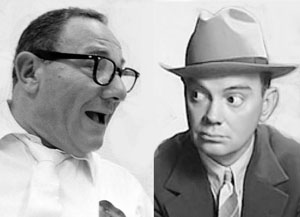
Alan Reed and Cliff Edwards
Along with such educational supply firms as McGraw-Hill and Xerox Films, Cathedral produced very popular filmstrip sets. A very popular alternative to 16mm movies, these usually took the form of boxed sets with die-cut cardboard insets to hold small 35mm filmstrip canisters with records providing the soundtracks and teaching guides on top or underneath. The first Tales of Jiminy Cricket series was available in collections of six stories each, based primarily on Disney short cartoons. A box included six stories on three red vinyl LP records, six filmstrips and a four-page “master guide” for each story. At the end of every story, Jiminy Cricket mentions a discussion point that suggests further interaction among the participants after the film.
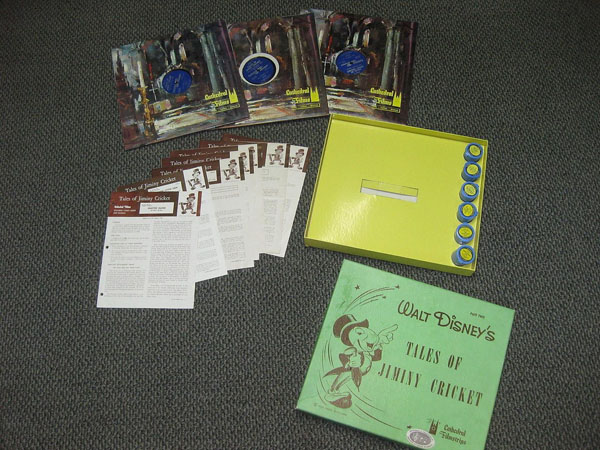
Encyclopedia Britannica purchased the Tales of Jiminy Cricket recordings from Cathedral Records, who produced them, and presumably the license from Disney. The packaging was changed though Cathedral is still listed on the labels as the producer. Britannica reorganized them into eight-story sets with eight filmstrips and four black vinyl records each, marketing them to primary grade schools. Teachers could use the guides to work the themes and discussions into their classroom lesson plans. This was one of the media precursors to the way today’s teachers can effectively use video, computer programs and online learning.
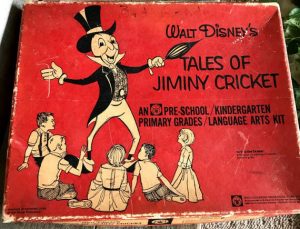 The records featured a “stock company” of great animation voice actors. In addition to Cliff Edwards’ narration of the stories, Paul Frees is heard at the top of each tale as well as in several roles. Disney Legend Ginny Tyler (who we just discussed in the recent Alice in Wonderland Spin) is heard in most of the recordings, and Alan Reed alternated with another Lady and the Tramp cast member, Dal McKennon.
The records featured a “stock company” of great animation voice actors. In addition to Cliff Edwards’ narration of the stories, Paul Frees is heard at the top of each tale as well as in several roles. Disney Legend Ginny Tyler (who we just discussed in the recent Alice in Wonderland Spin) is heard in most of the recordings, and Alan Reed alternated with another Lady and the Tramp cast member, Dal McKennon.
Each frame on the filmstrip was a different image, fed through the projector and cranked one by one in front of the lens to a screen for the group to watch. A harp arpeggio on the record told the operator of the filmstrip projector when to turn to the next picture (and to be designated the filmstrip operator was quite a coveted task). The Jiminy records offered a variety of pleasant harp signals to reduce the repetition to enhance the listening experience.
Some of Reed’s performances are represented below, as they were released only a year or so before The Flintstones premiered on ABC-TV as the first animated primetime series in history (and the longest-running after The Simpsons).
Hanna-Barbera afficionados will immediately recognize the background music as the same melodies they heard on early Huckleberry Hound, Yogi Bear and related cartoons. The cues were plentiful on The Donna Reed Show and many other live-action TV series of the era as well. It comes from the legendary Capitol Hi-Q production music library. Fellow historian Don Yowp provides a wide variety of these priceless cues as well as fascinating history at his excellent website.
THE COUNTRY COUSIN
Voices: Alan Reed (Monty Mouse); Ginny Tyler (Abner Mouse).
One of Reed’s many popular radio characters was comical poet laureate “Falstaff Openshaw” on The Fred Allen Show. His Monty Mouse voice is similar to his Falstaff persona, as well as the John MacLeish-type narrator in the Goofy cartoons and the haughty alter-ego “Fre-der-ick” personality adopted by Fred Flintstone in the first season episode, “The Split Personality.” The recording was adapted from the 1936 Silly Symphony cartoon.
THE GRASSHOPPER AND THE ANTS
Voices: Alan Reed (George Grasshopper); Paul Frees (Ant); Ginny Tyler (Queen of the Ants).
The grasshopper, given the name “George” in this adaptation of the 1934 Silly Symphony, has a voice that suggests Reed’s elderly version of Fred in the sixth season episode, “Rip Van Flintstone.”
THE GOLDEN TOUCH
Voices: Alan Reed (King Midas); Ginny Tyler (Goldie the Elf, Figaro).
This is the first vinyl appearance of the infamous 1935 Walt Disney-directed Silly Symphony (the actual soundtrack was released in 2016 and this Spin provides all the details) The story goes that Walt, in a misguided moment of pride, decided to direct a short cartoon himself. The results had so obviously “gone before a fall” that no one at the studio was foolish enough to mention it again. The generic cat that appeared in the cartoon is replaced in this recording by Figaro of Walt Disney’s Pinocchio in a brief cameo role. Midas also does not beg for a hamburger at the end of the record as he does in the original.
JIMINY CRICKET IN DUTCH
Voices: Paul Frees (Pluto, Villager); Alan Reed (Mayor, Villager); Ginny Tyler (Villager).
Jiminy isn’t the one who is “in Dutch,” a phrase for being in trouble, it’s actually Pluto in this adaptation of his 1946 short, “in Dutch.” In a twist on “The Boy Who Cried Wolf” Pluto does his “Lassie” best to save Holland from disaster. The cute little lady dog, usually identified as “Dinah,” is here given the name “Trixie.”
YABBA DABBA DOO! THE ALAN REED STORY
By Alan Reed and Ben Ohmart
Performed by Alan Reed, Jr.
Bill Marx as Fred Allen
Commentary by Joe Bevilaqua
Blackstone Publishing / Waterlogg Productions ISBN #978-1482930832. Five Compact Discs.
Released October 1, 2013. Produced by Joe Bevilaqua. (Also sold in book form.)
Available at Amazon.
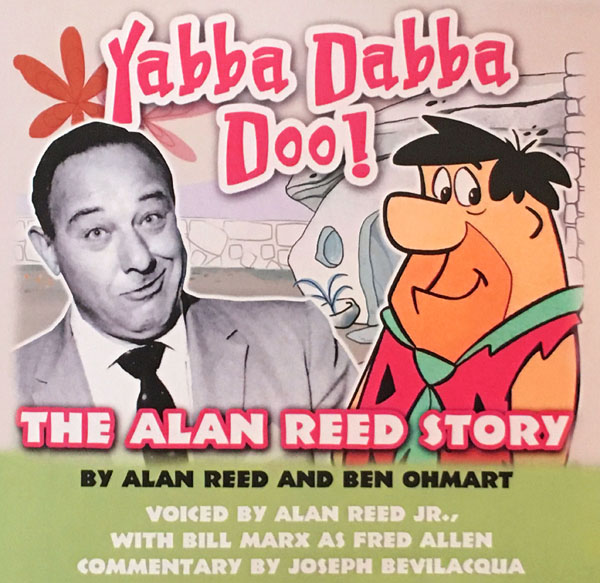
Like the Gravelberry Pie King, Alan Reed gets the royal treatment in this multi-disc set that is much more than an audio book. To quote some Peter Pan Records ad copy, it’s “a full-fledged musical and dramatic production” with rare interviews, vintage clips, background music and superb narration by Reed’s son, who has an impressive acting resumé of his own. Here is one of the chapters to hear as a sample.
Dozens of fascinating facts, anecdotes and surprising details abound as Reed’s life is chronicled from stage and radio to movies, television and animation, all in his own words. Here are just two little discoveries: he did not instantly come up with “Yabba Dabba Doo!” during a Flintstones session, but asked Joe Barbera ahead of time if he could come up with a catch phrase and worked on it diligently for several days before mentioning the phrase during the session. Barbera then approved it on the spot.
One other little gem—and very timely, too—is this witty 1956 radio sketch by Stan Freberg featuring Reed, Daws Butler, June Foray, Bill Thompson and other radio greats in a spoof of political conventions.


 GREG EHRBAR is a freelance writer/producer for television, advertising, books, theme parks and stage. Greg has worked on content for such studios as Disney, Warner and Universal, with some of Hollywood’s biggest stars. His numerous books include Mouse Tracks: The Story of Walt Disney Records (with Tim Hollis). Visit
GREG EHRBAR is a freelance writer/producer for television, advertising, books, theme parks and stage. Greg has worked on content for such studios as Disney, Warner and Universal, with some of Hollywood’s biggest stars. His numerous books include Mouse Tracks: The Story of Walt Disney Records (with Tim Hollis). Visit 






















































The production values of these recordings are impressive. Educational filmstrips were often assembled on the cheap, especially regarding the audio portion, but clearly these were produced with an ear for quality. These are equal to the best of the Disneyland Records. I was also impressed with the chapter of “The Alan Reed Story,” which proves that the old production values in audio recordings can still be achieved today.
There is one more Alan Reed-Disney connection that you didn’t mention. The audio version of Disney’s 1952 film “The Story of Robin Hood” produced by Capitol Records includes Alan Reed performing the roles of Little John, Friar Tuck, and the Sheriff of Nottingham. Anyone who is a fan of Reed’s voice work can recognize him at once. He proves very versatile in these roles. As Friar Tuck he even sings, proving that among his other talents, Alan Reed was an excellent singer–in character, yet. It’s worth a listen!
Very good addition! That’s an excellent recording that, to my knowledge, did not make it to LP. Several actors not always associated with Disney in film did quite a bit in other media. Thanks as always.
Jumping Jehoshaphat! That giant Jiminy on the album cover gives me the heebee-jeebies!
Those are some charming stories. It’s a shame they didn’t record the sequel to the King Midas legend, where Midas judges a musical contest between Pan and Apollo in favour of the former, and sore loser Apollo curses the king with the ears of a donkey. Jiminy Cricket had already had some prior experience with that sort of situation.
The “harp gliss” that signals the frame advance is actually an arpeggio on the celesta, the keyboard instrument featured in Tchaikovsky’s “Dance of the Sugar Plum Fairy” from the Nutcracker Suite. It really is quite clever how the chords are arranged to match the background music and the drama of the story. Much better than the annoying BEEP I remember from the filmstrips of my school days.
Denmark??? Well, given that Alan Reed’s Dutch mayor uses a lot of German expressions like “Was ist los?”, “Dummkopf!”, “Raus!” and “Ach, Du lieber Augustin!”, I suppose Pluto might just as well save Denmark while he’s at it. But it would be a really long dyke.
It tickles me that you’re observing Alan Reed’s birthday by posting his performance of the Un-birthday song — and with John Brown, yet! He always cracked me up as the friendly undertaker on “The Life of Riley”.
Well, cheerio! I’d better be… “shoveling off”!
What a Joe Rockhead is I! Especially when I should know better having sung along with the Jimmie Dodd and the Mouseketeers” “Clippity-clop-clop-clop go the wooden shoes” and listened to Jiminy tell me it was Holland over and over as I listened to this record. We will fix that and the arpeggio thingy. It’s correct of course that a keyboard makes it an arpeggio. I was going from my film & radio production background and how sound effects libraries labeled such things. But “Scales and Arpeggios” is my favorite “Aristocats” song (I plan to do a new Spin on those records soon).
There is only one person who essayed Fred Flintstone more then anyone else…Alan Reed. He was truly a voiceover legend.
Agreed – the only Fred Flintstone for me!!!
Me, as well.
Curious. If “The Golden Touch” was such a taboo subject at the Disney studio from the animators razzing Disney’s directing (though I always loved the picture), then why did Disney green-light a faithful rendition of it for a slide presentation during his lifetime? Had the order never to discuss the film expired by the late fifties, and Disney softened in mod about it?
Also, I’ve never seen anyone post the filmstrip illustrations that went with any of these records. Were they frame grabs from the films or redrawings? Anyone got one to share?
There was another filmstrip series issued by Disney on short 7″ 78’s, narrated by Jimmie Dodd. The records seem to have no production credit on the label – just the film title. I have one of “Don Donald”. Anyone know the source of these, and whether they were for school or home use?
I answered my own question on the second series of filmstrip records. They were marketed by Mattel for the “Mickey Mouse Club Newsreel Projector”, using mini-filmstrips mounted in cardboard or plastic frames with sprocket-like holes to advance the picture with a button. There’s a video of one on Youtube under “Mattel Mickey Mouse Club Newsreel Projector” of “Two-Gun Mickey”. And the visuals appear to be frame grabs – and good ones!
Don’t know about the Jimmie Dodd filmstrips, would love to hear the records. As for the Jiminy flimstrips, I only have the records.
It says something about Walt Disney that he did not eliminate a perfectly viable piece of “content” though he himself would never want to be reminded of it again. It’s not his “Star Wars Holiday Special.” The cartoon ran on the Mickey Mouse Club. While he was fully sware of what the various business units were doing, he may not have personally reviewed every frame, page and recording of everything. (The missing scene of Midas begging for a hamburger was probably a wise move, though, if only because it’s silly and the record stresses more healthy foods.)
I mainly remembered Alan Reed as the narrator of a few Goofy shorts in the early 1950s
I should point out that those Goofy shorts (one of which Gardner might go over in his column soon) predated “Lady and the Tramp” by a few years. Which means these were Reed’s first animated work.
Michael Harrington on FB reminded me that they are “Teachers Are People” and “Two Weeks Vacation”
That last “Tales of Jimmy Cricket” record was indeed based on a Pluto short from 1946 of the same title: https://www.dailymotion.com/video/x2xyizf
And it’s called “In Dutch!” Thanks, Nic. And this time, I’m sure it does not take place in Sopchoppy, Florida!
To clarify the Goofy shorts: Alan Reed narrated Teachers are People and Two Weeks Vacation (in the latter he also did a tramp and a mechanic). These were Goofy shorts that may have been recorded in 1951 for 1952 release, so he was indeed heard before Lady and the Tramp. Great article again, Greg. Sure wish I had copies of all the wonderful recordings you unearth. Reed is in my top ten of voice legends.
That’s very important. So the other two were first. Information is a wonderfully productive thing. Thank you, Keith!
Does anyone know if the Bill Marx who plays Fred Allen on the Alan Reed audiobook is Harpo’s son?
Yes indeed it is. And he does a fine job as Allen because it is a subtle impression rather than an overdone sound-alike, so he sounds more human than comical. It’s in a section about letters the two performers exchanged. They were very loyal and close friends.
I remember watching The Postman Always Rings Twice (1946) and hearing Fred Flintstone’s voice in the movie but it was Alan Reed in a minor role!!!
Greg, I show various Disney storybook and comics adaptations of THE GOLDEN TOUCH running into the 1950s; so while I’m certain the film had a bad rap inside the company, that didn’t seem to put a block on its being marketed. (Another film with a particularly bad rap internally seems to have been THE ROBBER KITTEN, but it too was promoted into the 1950s. In truth, I enjoy both shorts a great deal!)
Time usually makes the decision what to keep and what to throw away.
Reed also was in Magoo’s 1959 ARABIAN KNIGHTS and Friz Freleng’s HARE FORCE from 1944, he did the dog, Sylvester, next to Bea Benaderet as Granny (Betty!) and Mel Blanc as Bugs (Barney) (Though that may be Tedd Pierce.) But Reed did do the “Time Marches on” from “Porky’s Romance”, and I think some Lantz and MGM shorts./